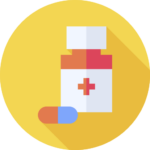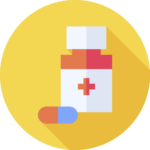Erectile Dysfunction (ED), often referred to as impotence, is a common but sensitive issue that affects millions of men worldwide. Despite its prevalence, many individuals are hesitant to discuss or seek help for this condition. In this blog, we will delve into what erectile dysfunction is, explore its causes, discuss treatment options, and highlight lifestyle changes that can make a significant difference.
Understanding Erectile Dysfunction
Erectile dysfunction is defined as the persistent inability to achieve or maintain an erection sufficient for sexual intercourse. It’s important to note that occasional difficulties with erections are normal and shouldn’t be confused with ED, which is characterized by its consistency and duration.
Causes of Erectile Dysfunction
- Physical Factors:
- Vascular Issues: Problems with blood flow, such as atherosclerosis (narrowing of blood vessels), can hinder the blood supply to the penis.
- Neurological Disorders: Conditions like multiple sclerosis and Parkinson’s disease can affect nerve signals involved in erections.
- Hormonal Imbalances: An imbalance in hormones, particularly testosterone, can contribute to ED.
- Psychological Factors:
- Stress and Anxiety: High-stress levels or performance anxiety can lead to temporary ED.
- Depression: Mood disorders often coincide with sexual dysfunction.
- Relationship Problems: Strained relationships can contribute to ED.
- Lifestyle Factors:
- Smoking: Smoking damages blood vessels and can lead to vascular-related ED.
- Excessive Alcohol Consumption: Chronic alcohol abuse can impair sexual function.
- Obesity: Being overweight increases the risk of ED due to hormonal changes and reduced blood flow.
- Lack of Exercise: Physical inactivity can contribute to obesity and vascular problems.
Treatment Options for Erectile Dysfunction
Fortunately, ED is treatable, and several options are available:
- Lifestyle Changes:
- Diet and Exercise: A healthy diet and regular physical activity can improve overall health, boost circulation, and reduce the risk of ED.
- Smoking Cessation: Quitting smoking can significantly improve vascular health.
- Moderate Alcohol Intake: Reducing alcohol consumption or abstaining altogether can benefit sexual function.
- Psychological Counseling: If psychological factors are contributing to ED, therapy or counseling may help address underlying issues and reduce anxiety.
- Medications:
- Oral Medications: Drugs like sildenafil (Viagra), tadalafil (Cialis), and vardenafil (Levitra) are phosphodiesterase type 5 (PDE5) inhibitors that enhance blood flow to the penis, enabling erections.
- Injections and Suppositories: Alprostadil, administered as an injection or suppository, can also stimulate blood flow to the penis.
- Hormone Therapy: In cases of hormonal imbalance, hormone replacement therapy may be recommended.
- Vacuum Erection Devices: These devices use a vacuum to draw blood into the penis, creating an erection. A constriction band is then placed at the base of the penis to maintain the erection.
- Surgical Implants: For severe cases, surgical implants like penile prostheses can be considered. These devices are surgically placed into the penis to allow for manual inflation.
Conclusion
Erectile dysfunction is a common condition that affects men of all ages. It’s crucial to remember that seeking help for ED is not a sign of weakness but a proactive step toward regaining a satisfying sex life and improving overall well-being. With a variety of treatment options available, including lifestyle changes, psychological counseling, and medications, men can regain confidence and intimacy. If you or a loved one is dealing with ED, consult with a healthcare professional to explore the most suitable approach for your unique situation. Remember, addressing erectile dysfunction can lead to a happier, healthier, and more fulfilling life.
If you suffer from erectile dysfunction, we advise taking Generic Viagra.












